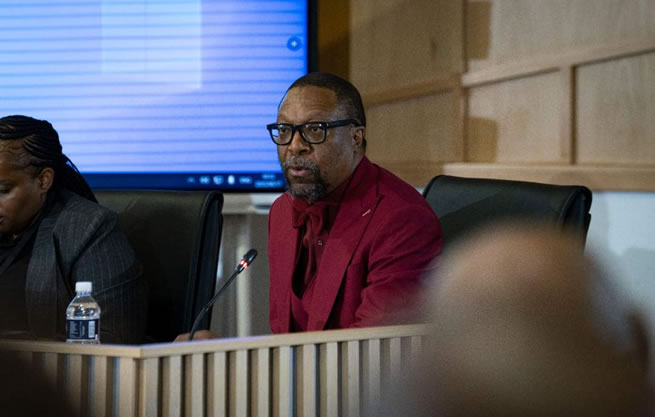Cracks have begun to show in the commission of inquiry led by Acting Deputy Chief Justice Mbuyiseli Madlanga, following reports that Chief Evidence Leader Terry Motau has requested to leave. This development has prompted urgent discussions among commission officials, who are eager to retain Motau’s expertise as the inquiry grapples with tight deadlines imposed by President Cyril Ramaphosa.
In a telephonic interview with City Press on Saturday, Motau confirmed that he is engaged in talks regarding his future at the commission but deemed it premature to discuss specifics. “I am advising you and request you to wait until next week and have full facts,” he stated. His departure would not only be a significant loss but would also cause serious delays in the commission’s operations while a replacement is sought.
Madlanga reportedly pleaded with Motau to reconsider his decision, warning that losing him would negatively impact the commission’s work, particularly as it operates under significant time constraints. The commission is tasked with issuing its first report within three months, a deadline set by Ramaphosa after delays in the commission's launch due to procurement issues.
Sources familiar with the commission’s operations revealed that Madlanga met with Motau on September 11, urging him to stay. “Motau told Madlanga he wanted to leave, but he was asked to reconsider his decision and has undertaken to give feedback soon,” said a source.
Motau is no stranger to high-profile investigations; he led the inquiry into the looting of approximately R2 billion from VBS Mutual Bank. His report, titled The Great Bank Heist, is a forensic document commissioned by the South African Reserve Bank, exposing systematic fraud, corruption, and mismanagement that led to the bank’s collapse. This report has become a crucial reference in discussions about financial governance and corruption in South Africa, influencing regulatory and legal actions in the financial sector.
His expertise in complex financial investigations has solidified his reputation as one of South Africa’s leading legal minds in matters of corruption and fraud. The commission is now poised to hear testimony from crime intelligence head Dumisani Khumalo, who is expected to corroborate the statements made by KwaZulu-Natal provincial commissioner Nhlanhla Mkhwanazi and police commissioner Fannie Masemola regarding alleged links between police members and the criminal underworld.
The inquiry was initiated after Mkhwanazi’s widely publicised press briefing, during which he alleged that a police investigation had uncovered a syndicate controlled by a drug cartel, involving politicians, law enforcement officials from the South African Police Service, metro police, correctional services, and members of the judiciary and business community.
In response to these allegations, President Ramaphosa instructed the formation of a commission to investigate the role of current and former senior officials in various institutions. These officials may have either aided or abetted the criminal activity, failed to act on credible intelligence or internal warnings, or benefited financially or politically from the syndicate's operations. The institutions under scrutiny include the South African Police Service, the National Prosecuting Authority, the State Security Agency, the judiciary and magistracy, and the metropolitan police departments of Johannesburg, Ekurhuleni, and Tshwane.
The commission will also investigate whether any members of the national executive responsible for the criminal justice system were complicit in, aided and abetted, or participated in the alleged criminal acts.
Since the announcement of the inquiry, Police Minister Senzo Mchunu has been placed on leave, while deputy national police commissioner responsible for detectives, Shadrack Sibiya, has been suspended. These actions reflect the serious nature of the allegations being examined by the commission, which aims to bring accountability to the forefront.
Attempts to reach commission spokesperson Jeremy Michaels for comment were unsuccessful, leaving uncertainties surrounding Motau's future unresolved. The outcome of these discussions could have significant implications for the commission’s ability to operate effectively and meet its mandated deadlines.
As the inquiry continues, the stakes remain high, with the potential for significant revelations regarding corruption and criminal collusion within South Africa's law enforcement and political landscapes. The next stages of the commission will be closely monitored, particularly as key testimonies are set to unfold, potentially altering the course of the ongoing investigations.

Follow Us on Twitter











